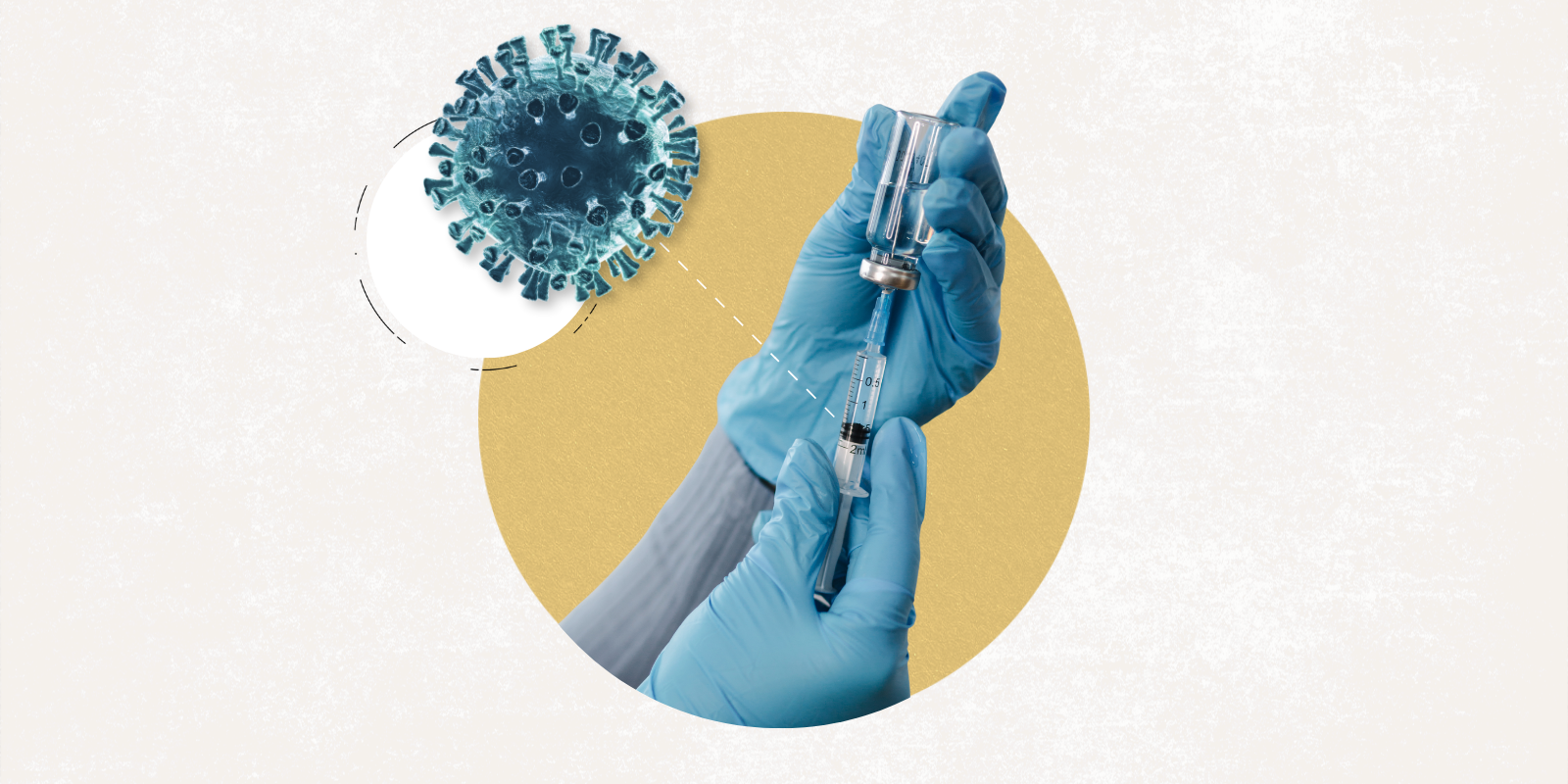Women whose pregnancies were confirmed during the pandemic now face another test: making the COVID-19 vaccine decision. With a new little being inside of them, a higher risk of severe disease while pregnant and a lag in pregnancy-related data for the vaccines, their early parenting choice offers no blanket answer.
“I really wavered back and forth on whether this was a good decision or not,” said Ashley Yingst, MS, a research assistant on the University of Colorado Anschutz Medical Campus, who just gave birth to her baby girl on April 18.
Please see other articles in our COVID-19 vaccine series here.
An uneven risk ratio complicates the issue and underscores the need for women to make their own decisions, said Anna Euser, MD, PhD. “You are weighing the potential risk of the vaccine, which we believe is minimal to none, versus getting COVID in pregnancy. That’s where everybody is going to be different.”
The two women have joined others on campus – including Emily Bates, PhD, who has launched an educational video campaign on COVID-19 vaccines – in sharing their personal stories in hopes of helping other expectant parents struggling with the choice.
Weighing pregnancy’s severe COVID-19 risk
Pregnant women face a higher risk of severe disease than non-pregnant women, according to the Centers for Disease Control and Prevention. That’s likely mostly due to immune system suppression while their babies grow, Bates said.
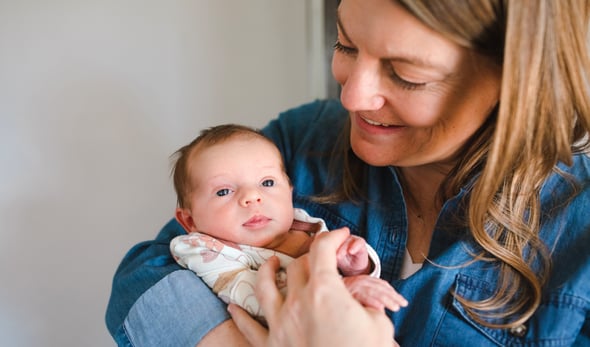
Anna Euser, MD, smiles at her baby girl, Nell. Photo credit: Tess Polivka |
“Our immune systems are trained to recognize anything that is foreign, and the baby is partially foreign. It’s not a clone of the mother,” said Bates, associate professor of pediatrics-developmental biology at the CU School of Medicine. Bates was delivering her baby boy when the campus shut down because of the pandemic last March.
Euser said experts were not surprised by the higher risk during pregnancy, although the reasons are not completely clear.
“There are other situations outside of COVID, such as urinary tract infections, kidney infections and the normal flu, that seem to hit pregnant women a little bit differently,” said Euser, assistant professor in OB/GYN-maternal fetal medicine, whose baby girl was born on Jan. 27. “Sometimes, the lungs are more affected, so that may be playing a role, too.”
Factoring exposure risk into equation
Treating severely ill pregnant women with COVID-19 while pregnant with her first baby during the pandemic weighed heavily in Euser’s decision, who received her first dose at 32 weeks pregnant.
“And my potential exposure was of reasonably high risk,” she said. “So, for me, the minimal theoretic risks of a vaccine in pregnancy were much, much less than the risk of COVID in pregnancy.”
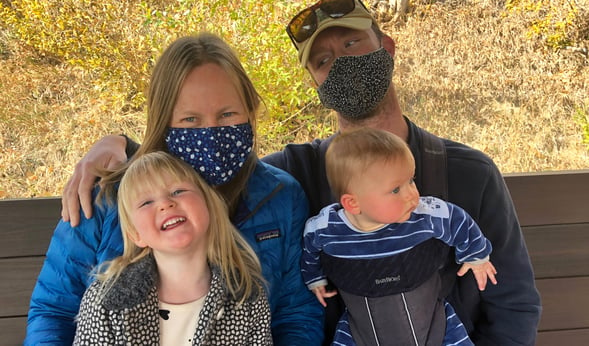
Emily Bates, PhD, with family, including baby Luke, born during the pandemic. |
Exposure fears helped steer her toward vaccination, said Yingst, who returned to work in the lab of Pediatrics Professor Michael Verneris, MD, before the vaccines were available.
Her wife is also a teacher who was working part-time in person before Yingst’s vaccine invitation in January, which she accepted at 23 weeks pregnant. “That really increased my risk of getting it, because she was around kids all day.”
Jobs, public transportation needs and housing environments should play into exposure risk assessments, as should any other high-risk factors for severe COVID-19, Euser said.
COVID-19 in mothers can also cause complications for baby, especially when moms experience the disease’s often high and enduring fevers, Bates said. For the same reason pregnant women are warned against being in hot tubs, a mother’s fever can result in development problems, such as neural tube defects, she said.
Considering vaccine risks with limited data
Initial clinical trials for the three vaccines in use during the U.S. vaccination campaign (with the Johnson & Johnson rollout currently paused) excluded pregnant women because of the immunizations’ experimental status. Therefore, data on vaccine safety during pregnancy are preliminary and largely anecdotal, Bates said.
“There were some women who did get pregnant during the clinical trials, even though they signed a form saying that they were not trying to get pregnant, and we know that those pregnancies have been safe,” Bates said.
Now, with thousands of pregnant women among the millions of Americans already vaccinated, experts are also monitoring many of those pregnancies and births with no signs of complications so far, she said.
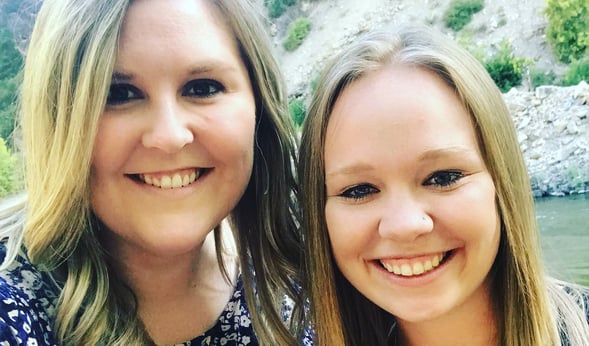
Ashley and Hope Yingst opted for the COVID-19 vaccine for Ashley during pregnancy. |
Euser and Yingst joined one of those programs, the CDC’s V-Safe COVID-19 Vaccine Pregnancy Registry, which monitors thousands of mothers through pregnancy and up to three months after birth. All vaccinated pregnant women can register within 30 days of receiving a vaccine.
Viewing issues through lens of basic science
Being a scientist and working on a medical campus helped Yingst make her choice. “I was able to talk to colleagues who are physicians and scientists,” Yingst said. Knowing how the vaccines work can also help women make informed decisions, she said.
While some vaccines with crippled viruses, such as the Measles, Mumps and Rubella (MMR) vaccine, are not recommended during pregnancy, the widely used Moderna and Pfizer vaccines contain no viruses.
Instead, using mRNA to send instructions, the new vaccines are injected into the muscle cells of the arm, where they teach the body how to make the SARS-CoV-2 spike proteins. Like a Snapchat, the mRNA quickly disappears from the cell, leaving the body to create its army of antibodies against the virus.
“When you just think about the basic science of what mRNA is and how they created this vaccine, there really shouldn’t be any rationale why it would affect pregnant women negatively,” Yingst said.
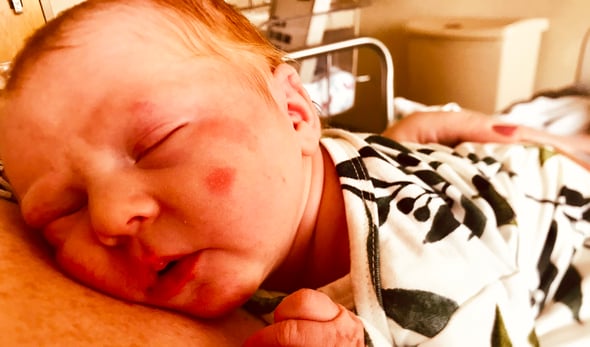
Baby girl Callen snuggles with mom Ashley Yingst after entering the world on April 18. |
Although the Johnson & Johnson vaccine works differently and contains a piece of a common cold virus, the three women said they would have received the vaccine if it had been offered. A recent pausing of its use due to a rare blood-clotting issue in some women would not change that decision, they all said.
“The relative risk is incredibly low,” Euser said of the clotting issue. “There have been six cases out of nearly 7 million doses given. So, literally, less than one in a million. That’s still less of a risk than having COVID or taking oral contraceptives.”
Taking timing during pregnancy into account
Evidence suggesting antibodies against SARS-CoV-2 were being transferred from vaccinated mothers to babies in utero and while breastfeeding clinched the decision for the three women. The babies when born are susceptible to the virus but cannot be vaccinated, Euser said.
“We actually use this (vaccination strategy) in prenatal care with other diseases,” Euser said, citing recommendations that pregnant women receive pertussis and flu vaccines to protect their babies.
While the three women believe pregnant women should take the vaccine when it is offered to them rather than risk not being able to get an appointment later, Bates said she could understand if a highly hesitant expectant mother waited until her second trimester.
“Those developmental processes that are affected by fever and can cause birth defects have already happened by the end of the first trimester,” Bates said. So, if a woman wanted to be extra cautious and completely isolate during the first trimester and then get the vaccine during the second trimester, Bates could understand, she said.
“It should be their own decision, and no one should be denied.” – Anna Euser, MD, on COVID-19 vaccines during pregnancy
“But you’d have to really protect yourself. Getting COVID during that time would be much worse than getting the vaccine during that time.”
Vaccine side effects can cause a fever in some people, but it should not be as high as with COVID and can be controlled with acetaminophen (Tylenol) if needed, Bates said, adding that ibuprofen (Advil) is not safe during pregnancy. Any fever should subside within 48 hours.
Avoiding false reports and owning the decision
The women also emphasized that expectant moms should make their own decision based on reputable literature and their own doctors’ guidance. And they should avoid worrying about false reports on the internet, from suggestions that the vaccines could affect fertility to claims they have adverse effects on pregnancy.
“The general message is that everybody should have the ability to get it if they want it,” Euser said, adding that some vaccination sites are incorrectly asking for a doctor’s permission for pregnant women. “It should be their own decision, and no one should be denied.”
With the threat of SARS-CoV-2 all around them, vaccines using newer technology, and another life growing inside them, Bates said she empathizes with women and the difficult decision.
“All I wanted was for my babies to be healthy, said Bates, who received her vaccine while breastfeeding her now year-old son. “I also want the suffering from this coronavirus to end.”
See Emily Bates' video episode on COVID-19 vaccines during pregnancy below.

.png)
